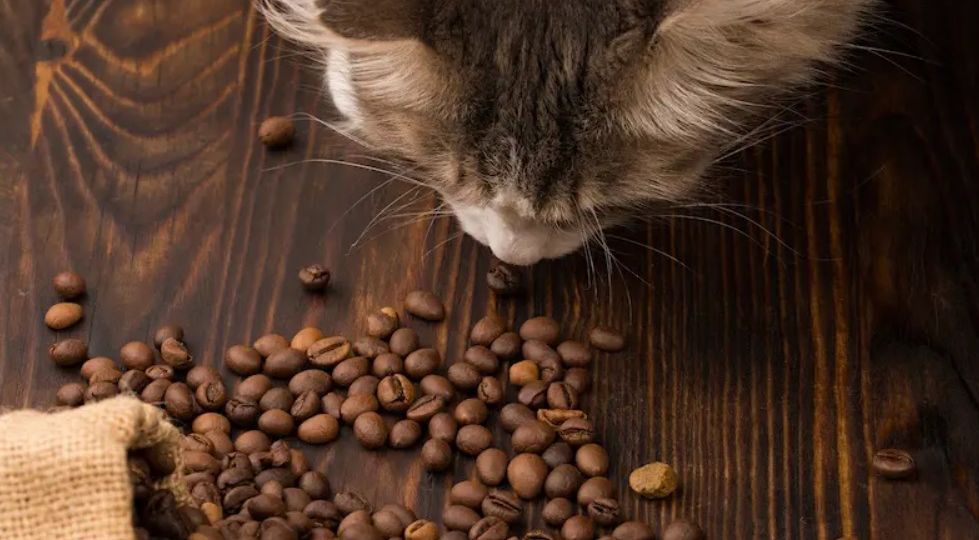
Coffee is a staple in many households, cherished for its ability to energize and bring comfort. However, for pet owners, particularly those with feline companions, the intersection of coffee consumption and pet safety presents a concern.
The rising popularity of coffee, paired with an increased awareness of pet health, has led to a growing interest in understanding how caffeine affects cats.
This awareness is crucial, as the ingestion of coffee beans, grounds, or brewed coffee by cats can lead to adverse health effects.
Understanding caffeine toxicity is essential for cat owners. Caffeine, a central nervous system stimulant found in coffee, tea, chocolate, and certain medications, poses significant risks to cats.
Cats are more sensitive to caffeine than humans, and even small amounts can cause symptoms of toxicity. This sensitivity necessitates a cautious approach to storing coffee and caffeinated products, ensuring they are out of reach of curious paws.
The Toxicity of Coffee Beans to Cats
Caffeine stimulates the central nervous system in cats, leading to a range of symptoms indicative of toxicity. The effects of caffeine can manifest rapidly, often within 30 minutes to an hour after ingestion, depending on the amount consumed and the size of the cat (VCA Animal Hospitals, Pet Poison Helpline).
The body’s response to this stimulant can include restlessness, hyperactivity, and an elevated heart rate, symptoms that can escalate to more severe conditions if not promptly addressed.
Are Coffee Beans Toxic to Cats?
The ingestion of coffee beans poses a real risk to feline health. Coffee beans contain concentrated amounts of caffeine, which can cause vomiting, diarrhea, restlessness, and an elevated heart rate in cats (Coffee Pursuing, PetMD).
These symptoms are not only distressing for the cat but can also lead to more severe health issues, such as seizures or death, in extreme cases. Given their sensitivity to caffeine, even a small exposure to coffee beans, grounds, or brewed coffee can result in caffeine toxicity.
Given these risks, it is paramount for cat owners to practice vigilance in keeping coffee and caffeinated products securely stored away from cats. Understanding the signs of caffeine toxicity and knowing how to respond if ingestion occurs are critical components of pet safety.
In the event of suspected caffeine ingestion, immediate consultation with a veterinarian is imperative to mitigate the effects and ensure the health and safety of the pet.
In summary, while coffee continues to be a beloved beverage among humans, its potential harm to cats cannot be overlooked.
Awareness and precautionary measures by pet owners can help prevent the adverse effects of caffeine toxicity, ensuring a safe and healthy environment for their feline friends.
Symptoms of Caffeine Poisoning in Cats
Cats exposed to caffeine may exhibit a range of symptoms indicative of poisoning. These include hyperactivity, restlessness, vomiting, an elevated heart rate and blood pressure, elevated body temperature, abnormal heart rhythm, tremors, seizures, and in severe cases, collapse (Pet Poison Helpline, PetMD).
The onset of these symptoms can be rapid, underscoring the need for immediate attention.
Toxic Consumption Levels
The level of caffeine considered toxic to cats varies, but generally, small amounts can be dangerous due to their sensitivity.
Toxic consumption levels for cats start at approximately 20 mg of caffeine per pound of body weight. For perspective, a single cup of brewed coffee can contain up to 100 mg of caffeine, making even small spills a potential risk (Vetmeds.org, Pet Keen).
Treatment and Prevention Strategies
Immediate action is crucial if a cat ingests caffeine. Pet owners should contact a veterinarian or an animal poison control center immediately.
Treatment may involve inducing vomiting, administering activated charcoal to absorb the toxins, and providing supportive care like fluids and monitoring heart rate and blood pressure (PetMD, A Great Coffee).
Prevention is key to ensuring cats are not exposed to caffeine. This includes keeping coffee beans, grounds, and caffeinated beverages out of reach, securing trash cans, and educating all household members about the risks caffeine poses to pets.
FAQs
What are the signs of caffeine toxicity in cats? Signs include restlessness, hyperactivity, vomiting, diarrhea, tremors, seizures, and elevated heart rate.
What should I do if my cat ingests coffee? Immediately contact your veterinarian or an animal poison control center for advice specific to your situation.
How can I prevent my cat from being poisoned by caffeine? Keep caffeinated products securely stored away, clean up spills immediately, and ensure trash is inaccessible to your cat.
Final Thoughts
The dangers of caffeine to cats cannot be overstated, with even small amounts posing significant health risks. Awareness and proactive prevention are essential for pet owners to safeguard their feline friends from accidental poisoning.
Ensuring a safe environment, free from hazardous substances like caffeine, is a fundamental aspect of responsible pet ownership.








